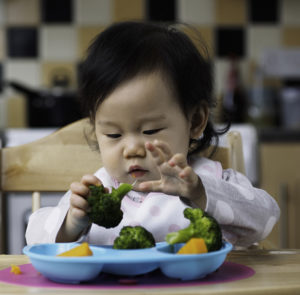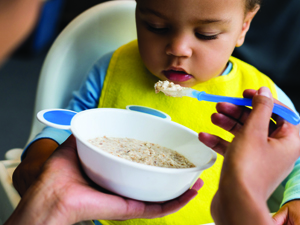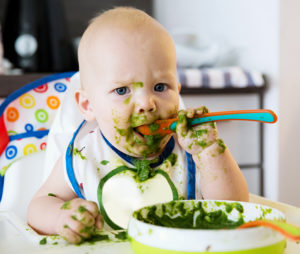First Solid Foods for Baby
by Dr. Lauren Brave, Pediatrician
Boulder Medical Center
Introducing first foods for baby is one of the most exciting times for new parents. It’s a sign that you’ve emerged from the newborn period and are headed for a new set of developmental skills.
The American Academy of Pediatrics (AAP) recommends “exclusive breast feeding for the first 6 months of your child’s life.” However, the AAP also acknowledges that babies are often developmentally ready for solids introduction between 4 and 6, with 5 months being average. Generally, introducing new foods are about adding new tastes and textures for the first months. Most kids start don’t start taking in a significant number of calories from food until between 9 and 12 months.
I think the most important thing to do is to follow your child’s lead. If they are interested, go for it! If they are not, no pressure. Here are some pointers for how to introduce solids into your child’s diet.
Is your baby ready?
Parents often wonder how they will know if their child is ready for solids. There are three things to look for before introducing first foods:
- Is your child able hold her head up for extended periods of time (i.e. no drooping)? Your baby should eat while sitting up, not reclining;
- Does your child have the tongue coordination to swallow more complicated textures instead of tongue-thrusting out the food? Give your a child a bite of food and see if tongue coordination is present;
- Most importantly, is your child interested in your food (i.e. does he watch you eat, mimic you chewing, grab your food)?
If your answers are YES, YES, and YES, you’re in business!
How to introduce first foods to your baby:
how much, food recommendations, and allergies…
The order of food introduction is much less rigorous than in the past. I do still recommend one new food every few days, however. If there is a reaction to food, it is easier to identify. Start with a spoonful and work your way up from there based on what your child wants. If your child doesn’t want to be fed by spoon, don’t force it. There are many ways for children to eat. We want this to be a fun and happy time without power struggles.
I don’t generally recommend rice cereal as a first baby food anymore. Rice in the United States is high in arsenic content and I would limit exposure to 1 to 2 servings per week. Therefore, if you start with a cereal, make it oatmeal. Fruits and vegetables are great first foods as well. Even though this is not scientific, I suggest starting with veggies and proteins to maintain low sugar content in your baby’s diet. Examples of proteins are beans or lentils and fish with no bones (if you eat meat). Eggs are also a great protein; you don’t need to separate the yolk and white.
If there is no immediate family history of food allergy, it is beneficial to introduce the more allergenic foods right away. Studies show that daily exposure to potential allergens, even if small, has been shown to prevent allergy development. If there is a family history of allergy, tell your pediatrician and see an allergist prior to introducing allergens. An example of introducing a more allergenic food: start with a tiny dot of peanut butter or tree nut butter mixed into a puree and go from there.

Giving whole items to grab and suck on is beneficial and should be used in conjunction with smooth food introduction.
Giving whole items to grab and suck on is a beneficial part of food introduction. This is often called baby-led weaning and should be used in conjunction with smooth food introduction. For example, if you are eating steamed broccoli for dinner, let your baby play with a piece. Picking it up is an exercise in independence. Feeling this on the gums is a good tactile experience. Later on, steamed broccoli can be used as a “spoon” to dip into smooth foods and self-feed. This is a really beneficial interaction with food.
The only things to avoid are honey (until 12 months), animal milks (until 12 months), and choking hazards (i.e small hard round objects like nuts and grapes). Note that avoiding milk doesn’t extend to all dairy; yogurt and soft pasteurized cheese are fine.
If stools start to get firm, introduce a little water. This is a good time to introduce the sippy cup. It might take a few months to figure out, but your baby will get it!
One last note: Food introduction is a mess; embrace it! Get a tarp. Expect food to hit the wall and cover your child from head to toe. This should be a fun process and not stressful. There’s never a reason to force feed your baby. If there is interest, go with it; if not, no worries.
Happy eating!
About Dr. Lauren Brave
Pediatric clinic locations in Boulder and Longmont
Dr. Brave practices in all areas of general pediatrics at Boulder Medical Center, including sick care and acute injuries, newborns, preventive medicine and well-child care.



